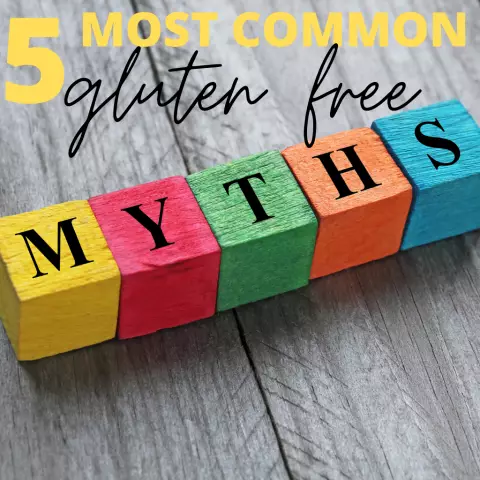- Author Rachel Wainwright wainwright@abchealthonline.com.
- Public 2023-12-15 07:39.
- Last modified 2025-11-02 20:14.
8 myths about gluten and gluten intolerances
Gluten (gluten) is a complex protein found in rye, barley and wheat. For most people, eating foods that contain gluten are not only safe but also very healthy. However, there are a number of myths about the negative effects that gluten supposedly has on human health.

Source: depositphotos.com
In reality, the situation is as follows. Some people do have gluten intolerance (celiac disease). It is a genetic disorder that has long been considered extremely rare. The development of modern diagnostic methods made it possible to reliably establish that there are more such patients than was thought. True, many of them do not have celiac disease in the most severe (life-threatening) form, but nevertheless, the disease significantly reduces the quality of life. Apparently, these facts gave rise to the fascination with gluten-free diets and numerous misconceptions about gluten. The most famous of these myths we want to dispel today.
Gluten intolerance is a very common condition
The gene that determines the propensity for gluten intolerance is in 0.5-1% of the world's population. Patients have severe digestive disorders, which appear in infancy - almost immediately after the introduction of complementary foods, if it contains cereals that are dangerous for such a person. In the case of an incorrect diagnosis of the disease and the lack of adequate assistance, the patient is threatened with progressive atrophy of the intestinal mucosa, delayed physical and mental development, the occurrence of type 1 diabetes mellitus, osteoporosis, iron deficiency anemia, dystrophy and other severe pathologies. The main method of treatment is a diet that excludes the ingestion of any amount of gluten. With the observance of the necessary diet, a rapid improvement occurs. A person with celiac disease is able to lead a normal life,nothing (except for dietary restrictions) does not differ from the life of healthy people.
Celiac disease is not a widespread disease: 99% of people tolerate gluten well. For comparison: problems with the digestion of whole milk are observed in 20% of Europeans, and relative to representatives of the Mongoloid race, the mentioned figure is even higher (for example, in China, milk protein intolerance is diagnosed in 90% of the adult population).
Eating gluten is the cause of flatulence
The misconception seems to be related to the fact that many people have flatulence after eating fresh bread or pastries. These foods, of course, contain gluten, but it is not because of it that the gases accumulate in the intestines. The fact is that a freshly baked product contains a large amount of fast carbohydrates, and the process of its digestion is accompanied by active fermentation. It is this that causes the formation of gases and flatulence.
The perception of this kind of products is very individual. If eating fresh baked goods leads to flatulence, it is worth giving up white bread and fresh buns in favor of crackers, biscuits and bread containing bran.
People who are overly addicted to gluten foods are obese
Abuse of flour products really threatens the appearance of obesity, but gluten has nothing to do with it. The risk for the figure is associated with the high calorie content of such a diet, combined with a lack of physical activity.
Gluten intolerance develops with improper diet
Proponents of gluten-free diets argue that celiac disease can be contracted by eating foods high in gluten. This is not true. Celiac disease is a genetically determined pathology. It is congenital, and it is impossible to acquire it during life.

Source: depositphotos.com
Eating gluten increases your risk of cardiovascular disease
There is not a single reliable result of clinical studies that would confirm this information. For a healthy person, foods containing gluten are safe. Excessive passion for alcohol, as well as fatty and high-calorie foods, is bad for the state of the heart and blood vessels.
Gluten Triggers the Development of Cancer
This statement is based on the results of examinations of patients with celiac disease. They do have a slightly increased risk of developing some malignant neoplasms of the intestine. However, scientists did not find a direct link between the absence of gluten in the diet and a decrease in the number of cancerous tumors. Such experiments have not been carried out with respect to healthy people, therefore it is incorrect to assume that gluten is a carcinogen.
Only Europeans suffer from gluten intolerance
Natives of Northern Europe have celiac disease in 1 person in 100. Residents of South America, Africa and Asia suffer from this disease less often: about 1 person in 300 gets sick.
Small doses of gluten are safe for celiac patients
For gluten intolerant people, gluten is a genetically foreign substance. Salvation for them can only be a diet that does not even contain microscopic doses of gluten. Therefore, such patients should be especially careful when choosing industrial finished products: confectionery and grocery products, canned food, sauces, sausages, meat and fish delicacies. Rice, buckwheat, legumes, corn, potatoes, fruits, vegetables, berries, meat, fish, eggs, dairy products, nuts and seeds do not contain fiber. Legumes and cereals can pose some danger associated with the technology of their pre-processing: sometimes these products are cleaned on the same equipment as cereals containing gluten. Conscientious manufacturers usually warn buyers about the possibility of traces of gluten in their products,placing appropriate labels on the packages.
For a healthy person, a gluten-free diet is useless. Moreover, it can harm the body, since a diet that restricts the consumption of cereals creates a deficiency of fiber necessary for vital activity. Some of the symptoms of gastrointestinal disorders are similar to those of celiac disease, but it does not follow that each of us can determine the cause of their occurrence and choose the right diet. If you have problems with digestion, you need to contact a specialist and undergo an examination in order to accurately diagnose the ailment and get adequate treatment.
YouTube video related to the article:

Maria Kulkes Medical journalist About the author
Education: First Moscow State Medical University named after I. M. Sechenov, specialty "General Medicine".
Found a mistake in the text? Select it and press Ctrl + Enter.






